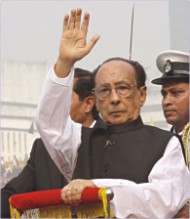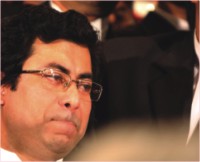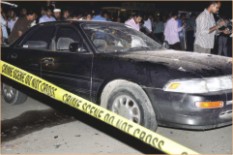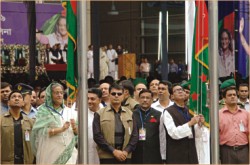
Inside
|
|
Year in Politics
In his inaugural address, the then president Iajuddin Ahmed termed the new Jatiya Sangsad a "parliament for change". His address echoed well with the ruling Awami League's (AL) "charter for change", which contributed to party's overwhelming victory in the polls. Fortunately, the new parliament witnessed some changes, as the main opposition BNP joined its inaugural sitting. All parliamentary standing committees were formed in the first session which made the House function effectively. But within a few months, they started facing difficulties in delivering on people's high expectations for change in the culture of destructive politics, which paved the way for emergency rule, thus delaying the constitution of the ninth parliament for around two years. The BNP forwarded a number demands to the ruling party as preconditions for their return to House and has been boycotting the sittings of parliament from second session since June.
Cabinet for the charter for change
People's expectations were high as they kept confidence in the AL's "charter for change." After five years of misrule from the BNP-Jamaat led alliance, they suffered a lot for another two years mainly because of skyrocketing prices of essentials during the past caretaker government. Hasina emerged with change as she left most of her senior party colleagues out of the cabinet and brought some surprise picks to run several important ministries. But resignation of State Minister for home affairs, Tanjim Ahmed Sohel Taj, triggered widespread speculation over interference in discharging his duties. The cabinet is going to complete its first year on January 5, 2010 with a few successes in its bag while it also has lot of things to do for the implementation of its electoral pledges. In the last one year, it faced some problems including the BDR carnage. The government is lucky in comparison to the previous ones as the main opposition has yet to step onto the streets with agitation programmes against the government.
Election to Upazila Parishad
But, the future and success of the upazila parishads still hangs in the balance, as they are not being allowed to function uninterrupted. Lawmakers were made all-powerful advisers to the parishads, allowing them to intervene in parishad activities. The elected representatives of the upazila parishads outright rejected MPs' advisory role in the parishads and have demanded that the provision be scrapped. The government however seems to have perceived the gravity of the prevailing situation and is likely to amend the upazila parishad act in the upcoming session of parliament to reduce the grievances of upazila parishad's representatives.
The month old government was put in an odd situation to handle the crisis, triggering fear in the public mind of political instability again. The government, however, showed tremendous farsightedness in handling the crisis that left 74 including 57 army officers dead. Unfortunately, the main opposition BNP never appreciated the government's effort to handle the situation. Rather they have been blasting the government for their faulty handling of the situation. Failure of the ruling and opposition to work together during the moment of national crisis demonstrated confrontational culture of politics of old. After the mutineers surrendered, many BDR men were tortured in the name of interrogation and 54 died allegedly form torture since the mutiny on February 25-26. The trial of the BDR men involved in mutiny began in November.
New President at Bangabhaban He entered into the dignified office in such a time when the then outgoing president was highly questioned for violating the constitution. Therefore, people expected that he would work to restore dignity and integrity to the top constitutional post. People still expect that the president will play a great role in building a bridge between the government and the opposition to strengthen the parliamentary democracy. After being elected in February, President Zillur Rahman is scheduled to address the House of the Nation on January 4, 2010 at the commencement of the first session of the ninth parliament in the new-year. It will be his first address before the ninth parliament that elected him as the president.
Verdict removed darkness The historic verdict dismissed the appeal petitions of five convicts against the third judgment of the High Court that handed them and seven others death penalty. These five, now languishing in jail, had filed the petitions in October 2007, giving five different points to challenge the High Court verdict. Of seven other convicts, six have been absconding while the other is dead. Now, the nation is waiting for the execution of the verdict to bury the long dirty politics began following the barbaric killing.
Attack on Taposh, MP
More shocking was revealed when five army officers detained for interrogation have named six of their former superiors as masterminds behind bomb attack on Taposh, a nephew of Prime Minister Sheikh Hasina and a prosecutor in the Bangabandhu murder case trial when it was going on at the Supreme Court. Following reports published in different newspapers, the army headquarters in a press release issued through Inter Services Public Relations (ISPR) announced that it is investigating the allegations of a few of its officers' involvement with the bomb attack on Taposh.
People extended wholehearted support to the AL's pledge for holding the trial. The ninth Parliament on January 29 passed unanimously passed a historic resolution calling on the government to ensure immediate trial of the war criminals. The House also amended the International Crimes (Tribunals) Act to this effect. Freedom fighters and people have been urging the government repeatedly to being the trial. The government has been taking preparation to begin the much-awaited trial of war criminals in early of the New Year. If the trial begins in line with the government's preparation, the new-year is expected to be a historic year in our national life.
Empowered by the national council to choose leaders for 45 posts in the party's central working committee, the AL chief nominated leaders for the posts, leaving out veterans like Amir Hossain Amu, Abdur Razzaq, Tofail Ahmed, Abdul Jalil and Suranjit Sengupta, and bringing in many fresh faces "in line with the charter for change". The party's national council however did not follow party charter properly in electing leadership as it only elected party president and secretary general and empowered newly elected AL chief Sheikh Hasina to choose leaders for 45 posts that include 13 members of the party Presidium, 31 departmental secretaries, and seven organising secretaries, and a treasurer. The AL constitution prescribes that councillors will elect the party president, Presidium members, a general secretary, departmental secretaries and a treasurer at the national council every three years.
Some amendments to the party constitution were approved at the party council to consolidate power of the BNP chairman further and empowered Tarique to act as BNP chief in absence of the chairman. Regarding to holding election to other posts in the party, the BNP national council followed its archrival AL national council's decision. It empowered re-elected BNP Chairperson Khaleda Zia to nominate leaders for party's national standing and executive committee, ignoring the party charter that stipulates election to the posts. The BNP national council also did not follow its own charter that stipulates election for the posts in the two committees. Empowered by the national council, the BNP chief started nominating leaders for the posts in the two bodies.
Compiled By Shakawat Liton Photos Star |
 Journey of the "parliament for change"
Journey of the "parliament for change" 
 It was the first election to reconstitute the crucial tier of local government system--upazila parishad, which was introduced during the military regime of H.M. Ershad and dissolved by an elected government led by BNP in 1991. It was the AL led government that revived the upazila parishad system in 1998 and its election was held when it came to power again.
It was the first election to reconstitute the crucial tier of local government system--upazila parishad, which was introduced during the military regime of H.M. Ershad and dissolved by an elected government led by BNP in 1991. It was the AL led government that revived the upazila parishad system in 1998 and its election was held when it came to power again.  Unimaginable carnage at BDR HQ
Unimaginable carnage at BDR HQ 
 Finally, the long awaited moment has come on November 19; the Appellate Division of the Supreme Court pronounced the historic verdict in the Bangabandhu killing case. The apex court upheld the death sentence to a dozen killers earlier confirmed by the High Court. It took for 34 years to remove the darkness that had hung over the nation following the heinous killing of Bangabanhdu Sheikh Mujibur Rahman.
Finally, the long awaited moment has come on November 19; the Appellate Division of the Supreme Court pronounced the historic verdict in the Bangabandhu killing case. The apex court upheld the death sentence to a dozen killers earlier confirmed by the High Court. It took for 34 years to remove the darkness that had hung over the nation following the heinous killing of Bangabanhdu Sheikh Mujibur Rahman.  The attack sparked heat in the parliament session and ruling party lawmakers accused BNP and Jamaat-e-Islami of joining hands with the killers of Bangabandhu, and of engaging together in a conspiracy to destabilise the country in a bid to regain power illegally.
The attack sparked heat in the parliament session and ruling party lawmakers accused BNP and Jamaat-e-Islami of joining hands with the killers of Bangabandhu, and of engaging together in a conspiracy to destabilise the country in a bid to regain power illegally. Trial of war criminals
Trial of war criminals  National Council of AL
National Council of AL  National Council of BNP
National Council of BNP